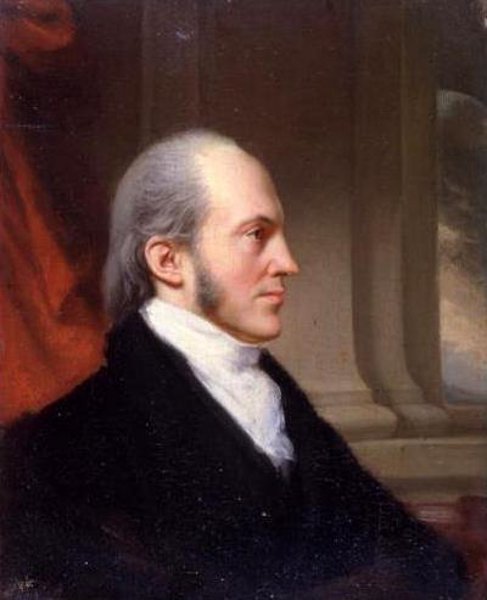1756-1836
Attorney General of New York, 1789-1791
Aaron Burr was born in Newark, New Jersey, on February 6, 1756. He was educated privately, then studied at the College of New Jersey (now Princeton University) from which he graduated in 1772. In keeping with family tradition, he studied theology in preparation for the ministry ,but changed course and enrolled in Litchfield Law School. This institution, set up in 1784 by Tapping Reeve, was the second formal law school to be established in America. Reeve later became Chief Justice of the Connecticut Supreme Court and was Burr’s brother-in-law and former tutor.
At the outbreak of the American Revolution, Burr joined the Continental Army and fought for American independence in battles at New York, Quebec, and Monmouth. The rigors of war and the resulting exhaustion affected his health and, in 1779, Colonel Burr resigned his commission.
Intermittently studying law as his health permitted, Burr was admitted to the bar at Albany in 1782 under the educational dispensation provided to those law students who had abandoned their studies to serve in the Revolutionary War. Following the British evacuation from New York City in 1783, Burr set up practice there. Despite a tendency to clash with other lawyers, including Alexander Hamilton, he was an able and successful lawyer. He was counsel in many important cases of the day including People v. Weeks, the first murder trial in the United States for which there is a full record. He also represented the plaintiff in the landmark takings case of Gardiner v The Trustees of the Village of Newburgh.
Aaron Burr was elected to the New York Assembly in 1784, and served as New York Attorney General from 1789 until 1791 when he was elected to the United States Senate. In 1792, Burr was offered a seat on the New York Supreme Court of Judicature, but declined the appointment.
Following six years as U.S. Senator, Burr returned to the New York Assembly where he served two non-consecutive terms. In the election of 1800, he was on the presidential ticket with Thomas Jefferson. When each received the same number of electoral votes, the House of Representatives determined that Jefferson should be President and Burr Vice-President. As President of the Senate, Burr was both fair and judicious, and he presided at the Senate’s first impeachment trial, that of Associate Justice Samuel Chase.
The long-standing bitterness between Hamilton and Burr was exacerbated when Hamilton, in Albany to argue People v. Croswell, remarked during a dinner party at the home of Judge Taylor that Mr. Burr was a dangerous man and ought not to be trusted with the reins of Government. Another guest wrote letters repeating the remarks, and these were published in the Albany Register. Burr demanded retraction and the situation escalated until, on July 11, 1804, Burr and Hamilton fought a duel in Weehawken, New Jersey. Burr mortally wounded Hamilton and fled from New Jersey to Washington where he completed his term of office as Vice President.
Three years later, the U.S. government alleged that, as part of a conspiracy to establish a separate confederacy composed of the Western states and territories, Burr levied war against the United States. Chief Justice John Marshall presided at the trial, and in a landmark decision narrowly construing the Constitution’s definition of treason, the defendant was acquitted. Burr moved to Europe for a time but in 1812, he returned to New York and to legal practice.
Aaron Burr died at Port Richmond, Staten Island, New York, on September 14, 1836.
Source
Biographical Directory of the United States Congress.

